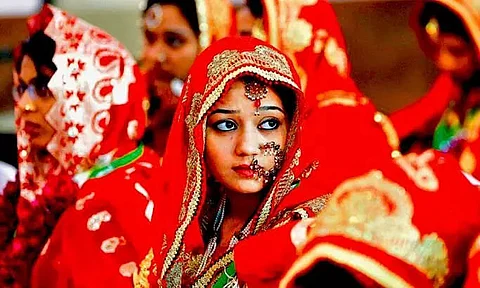
- Home
- Live Blog
- Breaking News
- Top Headlines
- Cities
- NE News
- Sentinel Media
- Sports
- Education
- Jobs

Ms Jyoti Mathur
(The writer is Executive Director, Policy & Research, Kailash Satyarthi Children’s Found)
POCSO Act clearly demarcates legal boundaries between the two (Child Marriage and child rape) and lifts the veil of family-sanctioned rape that negatively affects children
The recent statewide crackdown by the State Government of Assam towards the elimination of child marriages by initiating action against those men who married girls below 14 years of age under the Protection of Children from Sexual Offenses Act, 2012, and those who married girls in the age group of 14–18 years under the Prohibition of Child Marriage Act, 2006, has created wide-spread awareness, and has definitely shown a deterrent effect where people are afraid to solemnise child marriage. However, the questions raised by the Gauhati High Court inquiring about the purpose of lodging the criminal complaints under the POCSO Act must be clarified, and put to rest.
Article 39(e) of the Constitution of India, places a responsibility upon the state to direct its policy to secure that the tender age of children is not abused and their childhood is protected against exploitation. In furtherance of this directive principle, the landmark POCSO Act, 2012, was enacted and criminalises all kinds of sexual activity with a ‘child’ below the age of 18 years, irrespective of their gender, whether male or female, making no distinction between married and unmarried children. The POCSO Act defines the offences of penetrative and aggravated penetrative sexual assault that encompass the same elements as the offence of ‘rape’ under Section 375 of the Indian Penal Code, 1860 (“IPC”). The Act defines penetrative sexual assault as an aggravated offence when it is committed by a relative of the child through marriage, such as her husband.
It is relevant to mention that while deciding Writ Petition 382 of 2013 (Independent Thought vs. Union of India), the Hon’ble Supreme Court held that exception 2 to Section 375, IPC, which laid down that sexual intercourse by a man with his own wife not under 15 years of age is not rape, was discriminatory towards the girl child. The Hon’ble Court, while observing the exception as being against the intent of the POCSO Act, read down the age of 15 years, stating that it was in conflict with the POCSO Act, and clarified that the age mentioned in the provision should be read as 18 years.
On these lines, the laudable move by the State Government of Assam to undertake targeted legal action against those engaging in, abetting, or promoting child marriage by filing criminal complaints against every person marrying a child under the age of 14 years under the POCSO Act, must also be increased to protect all girls up to the uniform age of 18 years. This will truly and fully implement the letter and spirit of the POCSO Act, 2012, as well as the Prohibition of Child Marriage Act, 2006.
The misconceptions that prevent stringent legal action against child marriages such as child marriage being social practice, its widespread nature, breaking the notions of happy family and responsibility towards the children begotten through such child marriages, etc., must in no certain terms overshadow the fact that ultimately the act of child marriage is nothing but commission of a sexual offence upon a girl. These ill-conceived and ill-framed notions perpetuate this evil practice and have resulted in the incidence of child marriage among girls in India, where 1 in every 4 girls (23.3% [1]) is a victim of child marriage. These marriages are, in most cases, forcibly convened by the family of the girl child and consummated against her consent, and are nothing more than family- or society-sanctioned and endorsed child rape. The observations of Hon’ble Chief Justice Deepak Gupta in the Independent Thought case are relevant in this regard:
… if a girl aged 15 years is married off by her parents without her consent and the marriage is consummated against her consent, then also this girl child cannot file a criminal case against her husband. The State is talking of the reality of the child marriages. What about the reality of the rights of the girl child? Can this helpless, underprivileged girl be deprived of her right to say ‘yes’ or ‘no’ to marriage? Can she be deprived of her right to say ‘yes’ or ‘no’ to having sex with her husband, even if she has consented to the marriage? In my view, there is only one answer to this, and the answer must be a resounding “NO.”.
Therefore, the criminalization of sexual assault on children under the garb of child marriage is an offence recognised under the POCSO Act and affirmed by the Hon’ble Supreme Court. The stringent measures under the POCSO Act being invoked are much needed to root out this abhorrent practise from society and prevent it to the maximum possible extent. The disempowerment of girls or the helplessness of female victims of child marriage must not be allowed to become a reason for the perpetuation of the crime.
[1] As per the data of the National Family Health Survey-5 (NFHS-5).